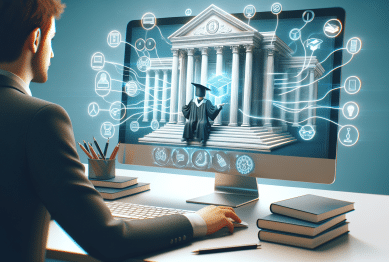Curious about how lifelong learning shapes real careers and personal growth? Explore accessible pathways, discover flexible education options, and see how online learning, microcredentials, and practical skills development are transforming educational journeys for people everywhere.
The Rise of Lifelong Learning in Modern Society
Lifelong learning is becoming central to how people prepare for changes in jobs, society, and technology. The traditional model of finishing education by early adulthood is shifting. Now, adults are continually returning to learning to stay current, achieve personal goals, or retrain for new careers. Flexible learning is essential. Digital transformation and the dynamic job market encourage individuals to adopt new knowledge and skills at every stage. Employers also value workers who commit to continuous improvement and adaptability, showing that education does not stop at graduation. The demand for relevant digital skills or new credentials can motivate even mid-career professionals to seek updated training and certifications.
The rise of online courses and open educational resources democratizes learning, allowing people to access high-quality content from anywhere. Massive Open Online Courses (MOOCs), podcasts, and digital microcredentials help learners keep pace with emerging knowledge. These new modalities support an inclusive educational landscape. They empower individuals who may not have had access to traditional schooling to participate in the economy or pursue higher credentials. Flexible schedules, accessible content, and varied teaching styles cater to different learning needs, fostering diversity and equity in society (Source: https://www.oecd.org/education/2030-project/teaching-and-learning/learning/).
The evolving nature of work pushes organizations and individuals to rethink education. Many employers are investing in upskilling programs to address skill gaps and prepare workers for new technology. Governments are also partnering with educational providers to launch public initiatives supporting lifelong educational journeys. These collaborations make learning a shared responsibility and encourage participation across generations. As technology and society evolve, adaptability and commitment to ongoing education become key. Lifelong learning connects people to emerging opportunities and encourages resilience in changing times.
Navigating the World of Microcredentials and Certificates
Microcredentials are short courses or certifications designed to teach specific skills. Unlike traditional degrees, these targeted programs allow learners to upskill efficiently in response to workplace needs. Popular in technology, healthcare, and business fields, microcredentials are often co-created by educational institutions and industry leaders. Some platforms even offer stackable credentials, so learners can build pathways toward larger qualifications over time. As companies increasingly recognize these microcredentials, job seekers are empowered to showcase verified skills or pivot into new areas.
Microcredentials also open doors for those balancing personal commitments with professional growth. They require less time and lower tuition than many degree programs. As a result, busy adults or career changers can progress at their own pace and fill specific knowledge gaps quickly. These credentials can align with changing industry standards, making them flexible tools for career mobility. Many organizations, like Coursera and edX, partner with top universities and employers to offer relevant and up-to-date courses (Source: https://www.coursera.org/articles/what-are-microcredentials).
Acceptance of microcredentials is rising. Employers increasingly value practical demonstrations of skills over traditional transcripts. These bite-sized qualifications can be added to online resumes, portfolios, or digital badges. They help bridge the gap between formal education and real-world requirements. Some learners use microcredentials as a stepping stone toward advanced education or as preparation for professional certification exams. Whether seeking a promotion or entering a new field, microcredentials offer adaptable, accessible options that resonate with today’s learners and employers alike.
Accessible Online Learning and Flexible Options
Online education is a cornerstone of flexible, accessible lifelong learning. With internet access, students can join courses from leading universities and subject experts worldwide. These digital classrooms support all ages, backgrounds, and schedules, making it easier than ever to learn while working or caring for a family. Platforms such as edX, Udemy, and OpenLearn give broad access to content—from fundamental literacy to advanced STEM (science, technology, engineering, mathematics) topics. The appeal lies in anytime, anywhere learning. Many programs also adapt to different skill levels, letting people find material that matches their unique goals and starting points.
Self-paced classes lower barriers for numerous learners. Individuals can review difficult material as needed or jump ahead if concepts are clear. Accessibility features like subtitles, audio descriptions, and mobile-friendly design help reach more people, including those with disabilities. Some organizations offer free resources or scholarships to expand participation, ensuring equity. Community support forums, peer reviews, and instructor feedback enhance engagement and retention. These designs foster motivation and create a virtual classroom experience that can be just as interactive as in-person programs (Source: https://www.open.edu/openlearn/).
The pandemic further accelerated online education, normalizing virtual classrooms and blended learning. Now, even universities and technical schools offer hybrid degrees, combining face-to-face and digital elements. Adult learners appreciate the flexibility, especially when courses fit around job schedules and family duties. As technology improves, more programs experiment with interactive tools—for example, gamification, project-based tasks, or AI tutoring. It’s clear online education is not a temporary solution but a lasting transformation in how society supports ongoing skills development and lifelong flexibility (Source: https://www.commonsense.org/education/articles/why-flexible-learning-is-essential).
Translating Skills Into Career Opportunities
Lifelong learning’s greatest value emerges when new skills open doors to fulfilling work. Employers are searching for workers who learn independently, adapt quickly, and solve real problems. Microcredentials and continuing education have proven especially helpful in industries facing talent shortages—like software, healthcare, or renewable energy. People who invest in new skills find themselves better prepared for emerging fields and resilient when markets shift. Reskilling opportunities also support greater diversity in technical professions, empowering more people to participate in the economy.
Upskilling directly impacts job readiness and advancement. Short-term certifications validate expertise, giving employers tangible evidence of ability. Many workforce development initiatives now include fast-track bootcamps or skill-building workshops in their pathways. These help students transition into roles whether as entry-level talent or as those returning from career breaks. In some sectors, hands-on projects or digital portfolios can be as valuable as formal degrees, highlighting practical application of knowledge (Source: https://www.brookings.edu/articles/the-changing-face-of-continuing-education/).
Lifelong learners also tend to demonstrate greater adaptability in rapidly changing environments. Their commitment to ongoing education makes them attractive hires, increasing chances for promotion or lateral moves. Many companies now support talent pipelines with educational partnerships and tuition benefits. This cycle benefits both individuals and employers, creating thriving workplaces focused on growth. Over time, lifelong learning becomes a habit—one that links individual aspirations with wider economic resilience and social well-being.
Overcoming Barriers to Lifelong Learning
Despite the benefits, not everyone finds it easy to access ongoing education. Challenges include lack of time, financial barriers, technology access, or self-doubt about returning to learning. Programs that offer scholarships or subsidized fees help, but more can be done to bridge gaps. Awareness campaigns, outreach services, and support groups encourage participation for adults who may feel left behind by formal systems. Reducing digital divides and investing in broadband infrastructure are key steps to ensure equity (Source: https://www.ulifelonglearning.org/resources/lifelong-learning-needs-barriers).
Personal motivation is another common barrier, especially for those overwhelmed by busy schedules or competing obligations. Mentoring programs, community learning circles, and virtual study groups provide encouragement and accountability. These networks foster a culture of belonging and reduce intimidation, making it easier for new learners to persist. Flexible course options and modular programs further reduce dropout rates and lower the pressure of balancing work, family, and education.
Policy also plays a role. National governments and local agencies can support lifelong learning by investing in public education infrastructure, funding adult learning centers, and promoting labor-market-aligned retraining. By addressing systemic obstacles, communities can build a lifelong learning culture that supports everyone. Inclusive design and high-quality guidance connect learners with opportunities. When barriers drop, lifelong learning transforms from aspiration to accessible reality for more people.
The Personal and Social Value of Lifelong Learning
Education is not just about getting a job—it’s about personal fulfillment, civic participation, and societal progress. Lifelong learning empowers people to grow, adapt, and contribute meaningfully in their communities. Whether it’s learning a language, starting a hobby, or volunteering, continued education connects individuals to broader social networks and shared values. These connections boost civic engagement, trust, and social capital—all of which strengthen society as a whole (Source: https://www.rand.org/pubs/research_briefs/RB10255.html).
Continued learning also supports mental and emotional well-being. Research links ongoing education to higher self-esteem, resilience, and cognitive agility into later adulthood. Participating in learning keeps the mind active, reduces isolation, and opens new perspectives. Adult educators often highlight these benefits, creating inclusive curricula that foster growth for learners at every stage. The sense of achievement from mastering new skills enhances life satisfaction and community pride.
Lifelong learning is society’s investment in a better future. As digital, demographic, and economic changes unfold, those committed to ongoing growth will be better equipped to thrive. Programs that support diverse learners and accessible pathways make these benefits widely available. Ultimately, lifelong learning is more than a personal choice—it is a cornerstone of resilient, innovative, and inclusive societies.
References
1. OECD. (n.d.). What is lifelong learning? Retrieved from https://www.oecd.org/education/2030-project/teaching-and-learning/learning/
2. Coursera. (n.d.). What are microcredentials. Retrieved from https://www.coursera.org/articles/what-are-microcredentials
3. OpenLearn. (n.d.). Free learning from The Open University. Retrieved from https://www.open.edu/openlearn/
4. Common Sense Education. (n.d.). Why flexible learning is essential for today’s classrooms. Retrieved from https://www.commonsense.org/education/articles/why-flexible-learning-is-essential
5. Brookings Institution. (2021). The changing face of continuing education. Retrieved from https://www.brookings.edu/articles/the-changing-face-of-continuing-education/
6. RAND Corporation. (2014). The impact of education on civic engagement and social capital. Retrieved from https://www.rand.org/pubs/research_briefs/RB10255.html









